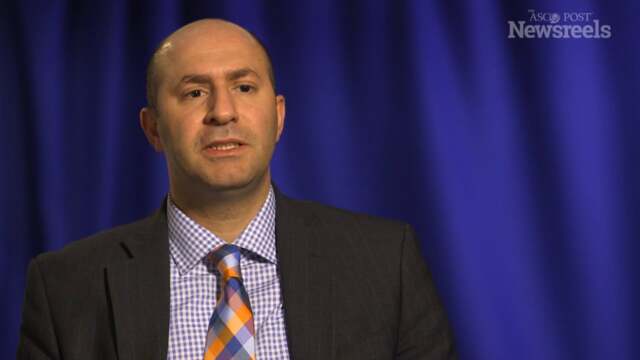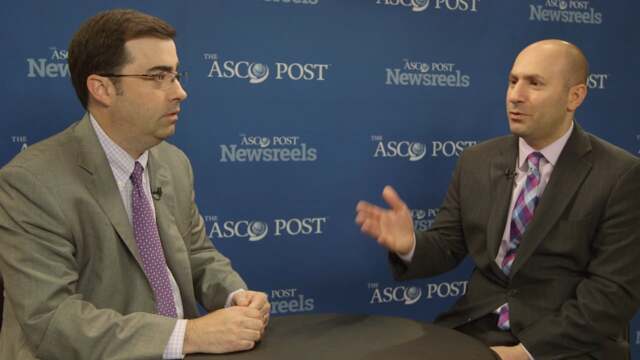Study Finds Cabozantinib of Clinical Benefit vs Sunitinib in Advanced Kidney Cancer
A randomized phase II clinical trial evaluating cabozantinib (Cabometyx) compared with standard-of-care sunitinib (Sutent) as first-line therapy for patients with advanced kidney cancer has found the experimental drug reduced the rate of disease progression or death by 34% compared with sunitinib....
Phase III Study of Sunitinib Is First to Show Benefit in Adjuvant Setting for Treatment of Renal Cell Carcinoma
Sunitinib (Sutent) improved disease-free survival by more than 1 year when used as adjuvant treatment for high-risk locoregional renal cell carcinoma following nephrectomy, but with the cost of toxicity. S-TRAC is the first phase III trial showing a benefit for adjuvant therapy in renal cell...
Cabozantinib Improves Progression-Free Survival and Response Rates vs Sunitinib in First-Line Treatment of Metastatic Kidney Cancer
Cabozantinib (Cabometyx) improved progression-free survival and response rates in patients with untreated metastatic renal cell carcinoma compared with the standard of care, sunitinib (Sutent), according to the results of a phase II multicenter randomized trial called CABOSUN reported at the 2016...
Study Finds Adjuvant Sunitinib Improves Disease-Free Survival in High-Risk Renal Cell Carcinoma After Nephrectomy
In the phase III S-TRAC trial reported at the 2016 European Society for Medical Oncology Congress and in The New England Journal of Medicine by Ravaud et al, adjuvant sunitinib (Sutent) significantly prolonged disease-free survival vs placebo in patients with high-risk renal cell carcinoma after...
Modification of Dosage Regimen for Nivolumab in Renal Cell Carcinoma, Melanoma, and NSCLC
In the Clinic provides overviews of novel oncology agents, addressing indications, mechanisms, administration recommendations, safety profiles, and other essential information needed for the appropriate clinical use of these drugs. On September 13, 2016, the U.S. Food and Drug Administration...
Is Nivolumab Active in Recurrent Advanced Urothelial Carcinoma?
In the phase I/II CheckMate 032 trial reported in The Lancet Oncology, Sharma et al found that nivolumab (Opdivo) was active in locally advanced or metastatic urothelial carcinoma progressing after platinum-based therapy. In the study, 78 patients with urothelial carcinoma of the renal pelvis,...
ESMO 2016: Cabozantinib Improves Progression-Free Survival in Metastatic Renal Cell Carcinoma
Cabozantinib (Cabometyx, Cometriq) significantly improves progression-free survival and response rate in patients with metastatic renal cell carcinoma compared to sunitinib (Sutent), according to research presented by Choueiri et al at the 2016 European Society for Medical Oncology (ESMO)...
Does Adding IMA901 Vaccine to Sunitinib Improve Survival in Advanced Renal Cell Carcinoma?
In the phase III IMPRINT trial reported in The Lancet Oncology, Rini et al found no overall survival benefit of adding the multipeptide cancer vaccine IMA901 to sunitinib (Sutent) in the first-line treatment of locally advanced or metastatic renal cell carcinoma. IMA901 contains 10 tumor-associated ...
ESMO 2016: Longer Disease-Free Survival in Phase III Trial of Sunitinib as Adjuvant Treatment for Kidney Cancer
A phase III trial of sunitinib (Sutent) has met its primary endpoint of disease-free survival for adjuvant treatment of high-risk renal cell carcinoma after nephrectomy, reported Ravaud et al at the European Society for Medical Oncology (ESMO) 2016 Congress in Copenhagen (Abstract LBA11_PR)....
Alain Ravaud, MD, PhD, on RCC: Results of the S-TRAC Trial (French Language Version)
Alain Ravaud, MD, PhD, of Bordeaux University Hospital, discusses in French phase III findings on sunitinib vs placebo as adjuvant treatment for high-risk renal cell carcinoma after nephrectomy. (Abstract LBA11)
Alain Ravaud, MD, PhD, on RCC: Results of the S-TRAC Trial
Alain Ravaud, MD, PhD, of Bordeaux University Hospital, discusses phase III findings on sunitinib vs placebo as adjuvant treatment for high-risk renal cell carcinoma after nephrectomy. (Abstract LBA11)
Toni K. Choueiri, MD, on Metastatic RCC: Results From the ALLIANCE A031203 Trial
Toni K. Choueiri, MD, of the Dana-Farber Cancer Institute, discusses study findings on cabozantinib vs sunitinib as initial targeted therapy for patients with metastatic renal cell carcinoma of poor and intermediate risk. (Abstract LBA30) Follow him on Twitter: @DrChoueiri
Extended Active Surveillance Prior to Systemic Therapy May Be Safe in Some Patients With Metastatic Renal Cell Carcinoma
In a phase II trial reported in The Lancet Oncology, Brian I. Rini, MD, of the Cleveland Clinic Taussig Cancer Institute, and colleagues found that some patients with metastatic renal cell carcinoma can safely undergo active surveillance for an extended duration prior to initiation of systemic...
Combining AM0010 and Pembrolizumab Produced Antitumor Activity in Patients With Advanced Solid Tumors
A multibasket phase Ib study evaluating the clinical activity, tolerability, and antitumor activity of the cytokine-based immunotherapy AM0010 alone or in combination with the immune checkpoint inhibitor pembrolizumab (Keytruda) has found that in monotherapy, objective responses to AM0010 were ...
I’ve Survived Cancer for Over 71 Years
Even though I was just 3 years old when my symptoms first appeared, the memory is still fresh in my mind to this day, 71 years later. I had just come home from a friend’s birthday party and was sitting on the front patio steps immobilized by severe stomach pain. My parents said I was feeling ill...
Everolimus Plus Bevacizumab Shows Activity in Advanced Non–Clear Cell Renal Cell Carcinoma
The combination of everolimus (Afinitor, Zortress) and bevacizumab (Avastin) was associated with clinical benefit in advanced non–clear cell renal cell carcinoma with a major papillary component, according to a single-center phase II trial reported by Voss et al in the Journal of Clinical...
FDA Modifies Dosage Regimen for Nivolumab
On September 13, 2016, the U.S. Food and Drug Administration (FDA) modified the dosage regimen for nivolumab (Opdivo) for the currently approved indications for renal cell carcinoma, metastatic melanoma, and non–small cell lung cancer (NSCLC). The currently approved recommended dosage...
Multitude of Mentors Help Shape an Illustrious Career in Oncology
Sumanta K. Pal, MD, has had a longer career in oncology than many other colleagues his age. Perhaps the reason for that may center on his starting college at the age 13 and medical school at the age of 17. Today this internationally recognized leader in genitourinary cancers is Assistant Professor ...
Is Obesity a Prognostic Factor for Improved Survival in Metastatic Renal Cell Carcinoma?
In a study investigating the clinical and biologic effects of body mass index on treatment outcomes in patients with metastatic renal cell carcinoma, Albiges et al found that obese patients treated with targeted therapy had improved survival and progression-free survival compared with patients with ...
Accumulation of Metabolite Fumarate May Be Linked to Hereditary Leiomyomatosis and Renal Cell Cancer
Researchers funded by the Medical Research Council (MRC) have shown that when the metabolite fumarate accumulates in a hereditary form of renal cancer, it leads to an epigenetic reprogramming that drives cancer, according to a study published by Sciacovelli et al in Nature. The tumor growth...
Incidence of PD-1 Inhibitor–Related Pneumonitis in Advanced NSCLC, Renal Cell Carcinoma, and Melanoma
In a systematic review and meta-analysis reported in JAMA Oncology, Nishino et al identified the rates of PD-1 (programmed cell death protein 1) inhibitor–related pneumonitis in patients with advanced non–small cell lung cancer (NSCLC), renal cell carcinoma, and melanoma. Rates were...
Extended Active Surveillance Prior to Systemic Therapy May Be Safe in Some Patients With Metastatic Renal Cell Carcinoma
In a phase II trial reported in The Lancet Oncology, Rini et al found that some patients with metastatic renal cell carcinoma can safely undergo active surveillance for an extended duration prior to initiation of systemic therapy. Indolent growth of metastases is known to occur in some patients...
Quality of Life With Nivolumab vs Everolimus in Advanced Renal Cell Carcinoma
Patients with previously treated advanced renal cell carcinoma receiving nivolumab (Opdivo) in the phase III CheckMate 025 trial had improved health-related quality of life compared with those receiving everolimus (Afinitor), as reported by David Cella, PhD, of Northwestern University, Chicago, et...
Final Results of METEOR Trial: Cabozantinib vs Everolimus in Advanced Renal Cell Carcinoma
As reported by Toni K. Choueiri, MD, of Dana-Farber Cancer Institute, et al in The Lancet Oncology, the final results of the phase III METEOR trial indicate significantly improved overall survival with cabozantinib (Cabometyx) vs everolimus (Afinitor) in patients with advanced renal cell carcinoma...
Metabolic Gene-Expression Profile May Identify Kidney Cancer Patients Unlikely to Benefit From Nivolumab
Renal cell carcinomas (RCC) positive for the protein programmed death ligand 1 (PD-L1) from patients who did not respond to treatment with the anti–PD-1 therapeutic nivolumab (Opdivo) had significantly higher expression of genes associated with metabolism, compared with PD-L1–positive...
European Study Finds Chromosome 1q Gain Linked to Poorer Outcome in Wilms Tumor Treated With Preoperative Chemotherapy
In a study reported in the Journal of Clinical Oncology, Chagtai et al of the International Society of Paediatric Oncology (SIOP) Renal Tumours Study Group found that chromosome 1q gain was associated with poorer event-free survival in patients with Wilms tumor treated with preoperative...
Poorer Outcome in Favorable-Histology Wilms Tumor Associated With Chromosome 1q Gain Reported in U.S. Study
The Children’s Oncology Group found that chromosome 1q gain is associated with poorer event-free and overall survival in patients with favorable-histology Wilms tumor. Gratias et al reported these findings in the Journal of Clinical Oncology. Study Details The study involved analysis of...
When Combined With Targeted Therapy, Cytoreductive Nephrectomy May Improve Survival in Metastatic RCC
In a National Cancer Data Base study reported in the Journal of Clinical Oncology, Hanna et al found that cytoreductive nephrectomy may improve survival in patients receiving targeted therapy for metastatic renal cell carcinoma. Study Details The study involved data from 15,390 patients treated...
Final Results of METEOR Trial Show Cabozantinib Improves Overall Survival vs Everolimus in Advanced RCC
As reported by Choueiri et al in The Lancet Oncology, the final results of the phase III METEOR trial indicate significantly improved overall survival with cabozantinib (Cabometyx) vs everolimus (Afinitor) in patients with advanced renal cell carcinoma (RCC) that had progressed after previous...
Improved Quality of Life Reported With Nivolumab vs Everolimus in Advanced Renal Cell Carcinoma
Patients with previously treated advanced renal cell carcinoma receiving nivolumab (Opdivo) in the phase III CheckMate 025 trial had improved health-related quality of life compared with those receiving everolimus (Afinitor), as reported by Cella et al in The Lancet Oncology. Study Details In the ...
ASCO 2016: Nivolumab Extends Survival for Patients With Advanced Renal Cell Carcinoma Treated Beyond Disease Progression
In a large randomized study, the immunotherapy drug nivolumab (Opdivo), an anti–PD-1 (programmed cell death protein 1) monoclonal antibody, was shown to be a safe and effective therapy for kidney cancer even in patients who continued treatment after their disease progressed. Results ...
Lenvatinib in Combination With Everolimus in Advanced Renal Cell Carcinoma
In the Clinic provides overviews of novel oncology agents, addressing indications, mechanisms, administration recommendations, safety profiles, and other essential information needed for the appropriate clinical use of these drugs. On May 13, 2016, lenvatinib (Lenvima) was approved for use in...
David F. McDermott, MD, and Toni K. Choueiri, MD, on Advanced RCC: Nivolumab in Previously Treated Patients
David F. McDermott, MD, of Beth Israel Deaconess Medical Center, and Toni K. Choueiri, MD, of the Dana-Farber Cancer Institute, discuss an update on data from phase I and II studies of nivolumab given to patients with metastatic renal cell carcinoma, including long-term overall survival and potential predictors of benefit (Abstract 4507).
FDA Approves Lenvatinib in Combination With Everolimus in Advanced Renal Cell Carcinoma
On May 13, 2016, the U.S. Food and Drug Administration (FDA) approved lenvatinib capsules (Lenvima) in combination with everolimus (Afinitor) for the treatment of advanced renal cell carcinoma following one prior antiangiogenic therapy. Lenvatinib was first approved in 2015 for the treatment of...
Curb Your Enthusiasm: No Benefit of Adjuvant Sorafenib or Sunitinib in Nonmetastatic Renal Cell Carcinoma
Renal cell carcinoma is the most common cancer of the kidneys. Up to 30% of patients present with advanced/metastatic disease, and recurrence can develop in patients at high risk treated by nephrectomy for localized tumors. Renal cell carcinoma is notoriously resistant to chemotherapy and...
No Disease-Free Survival Benefit of Adjuvant Sunitinib or Sorafenib in High-Risk Nonmetastatic Renal Cell Carcinoma
In the phase III ECOG-ACRIN E2805 trial reported in The Lancet by Naomi B. Haas, MD, of Abramson Cancer Center, University of Pennsylvania, and colleagues, no benefit of adjuvant vascular endothelial growth factor receptor (VEGFR) inhibitor treatment with sunitinib or sorafenib (Nexavar) was...
Crizotinib Active in Orphan Kidney Malignancy
Crizotinib (Xalkori) achieved overall and durable responses in advanced inoperable papillary renal cell carcinoma type 1 characterized by somatic MET mutations, according to an investigator-initiated trial conducted by the European Organization for Research and Treatment of Cancer (EORTC).1 “To...
Cabozantinib in Advanced Renal Cell Carcinoma
In the Clinic provides overviews of novel oncology agents, addressing indications, mechanisms, administration recommendations, safety profiles, and other essential information needed for the appropriate clinical use of these drugs. On April 25, 2016, a tablet formulation of cabozantinib...
FDA Approves Lenvatinib in Combination With Everolimus in Advanced Renal Cell Carcinoma
On May 13, 2016, the U.S. Food and Drug Administration (FDA) approved lenvatinib capsules (Lenvima), in combination with everolimus (Afinitor) for the treatment of advanced renal cell carcinoma following one prior antiangiogenic therapy. Lenvatinib was first approved in 2015 for the treatment...
FDA Approves Cabozantinib in Patients With Renal Cell Carcinoma Who Have Received Prior Antiangiogenic Therapy
On April 25, 2016, the U.S. Food and Drug Administration (FDA) approved cabozantinib (Cabometyx) tablets for the treatment of advanced renal cell carcinoma in patients who have received prior antiangiogenic therapy. Cabozantinib is a dual tyrosine kinase inhibitor of MET and VEGFR2. The capsule...
FDA Approves Cabozantinib in Patients With Renal Cell Carcinoma Who Have Received Prior Antiangiogenic Therapy
On April 25, 2016, the U.S. Food and Drug Administration (FDA) approved cabozantinib (Cabometyx) tablets for the treatment of advanced renal cell carcinoma in patients who have received prior antiangiogenic therapy. Cabozantinib is a dual tyrosine kinase inhibitor of MET and VEGFR2. The...
Study Finds Apitolisib Less Effective Than Everolimus in Metastatic Renal Cell Carcinoma
As reported in the Journal of Clinical Oncology by Powles et al, the dual PI3K/mTOR inhibitor apitolisib was inferior to the mTOR inhibitor everolimus (Afinitor) in progression-free survival in a phase II trial in patients with metastatic clear cell renal cell carcinoma progressing on or after...
No Disease-Free Survival Benefit of Adjuvant Sunitinib or Sorafenib in High-Risk Nonmetastatic Renal Cell Carcinoma
In a phase III trial (ECOG-ACRIN E2805) reported in The Lancet by Haas et al, no benefit of adjuvant VEGFR (vascular endothelial growth factor receptor) inhibitor treatment with sunitinib or sorafenib (Nexavar) was observed vs placebo in patients with completely resected high-risk nonmetastatic...
Genomic, Molecular Differences in Tumor Biology May Explain Inferior Survival in African Americans With Kidney Cancer
African Americans who develop metastatic renal cell carcinoma have had worse survival historically than whites. With the advent of targeted therapy, the hope is that the gap in survival would be narrowed. However, a new study has shown that survival for African Americans with metastatic renal cell...
Removal of Complex Renal Tumors Performed Safely by Robotic Surgery in Selected Patients
Renal cell carcinoma can sometimes spread to the inferior vena cava, posing a threat to the heart and brain. Robotic nephrectomy for inferior vena cava tumor thrombus has favorable outcomes in selected patients compared with open surgery, which can have a high rate of complications, reported Abaza...
Two Contenders for Second-Line Treatment of Advanced Renal Cell Carcinoma
Options for second-line therapy of advanced/metastatic renal cell carcinoma are expanding. Updates from the CheckMate 025 and METEOR trials presented at the 2016 Genitourinary Cancers Symposium solidify the value of both nivolumab (Opdivo, an immune checkpoint inhibitor) and cabozantinib...
Eric Jonasch, MD, on Kidney Cancer: Current and Novel Treatment Options
Eric Jonasch, MD, of The University of Texas, MD Anderson Cancer Center, discusses the progress being made in kidney cancer treatment and the clinical trials that focused on sunitinib, sorafenib, and everolimus, among others.
Cora N. Sternberg, MD, on New Targets in Renal Cell Carcinoma
Cora N. Sternberg, MD, of San Camillo Forlanini Hospital, summarizes a teaching lecture on new targets in renal cell carcinoma, and discusses what to expect for the future of treating RCC.
Brian I. Rini, MD, on A Cancer Vaccine for Renal Cell Carcinoma
Brian I. Rini, MD, of the Cleveland Clinic Taussig Cancer Institute, discusses the results from a phase III study investigating a multipeptide cancer vaccine in patients receiving sunitinib as first-line therapy for advanced/metastatic renal cell carcinoma (Abstract 17LBA).
Robert J. Motzer, MD, on Phase III Results of CheckMate 025 Nivolumab vs Everolimus in Advanced RCC
Robert J. Motzer, MD, of Memorial Sloan Kettering Cancer Center, discusses the results of this study, which could well change the treatment paradigm in patients with previously treated metastatic renal cell carcinoma (Abstract 3LBA).








